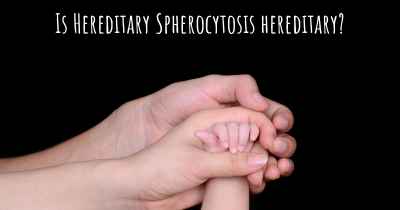What is the life expectancy of someone with Hereditary Spherocytosis?
Life expectancy of people with Hereditary Spherocytosis and recent progresses and researches in Hereditary Spherocytosis

Hereditary Spherocytosis is a genetic disorder that affects the red blood cells, causing them to be spherical instead of the normal disc shape. This condition can lead to anemia, jaundice, and an enlarged spleen. The life expectancy of individuals with Hereditary Spherocytosis can vary depending on the severity of the disease and the effectiveness of treatment. With proper management, including regular monitoring, blood transfusions if necessary, and in some cases, splenectomy (surgical removal of the spleen), individuals with Hereditary Spherocytosis can lead relatively normal lives. However, it is important to consult with a healthcare professional for personalized information and guidance regarding life expectancy and treatment options.
Hereditary Spherocytosis (HS) is a genetic disorder characterized by abnormal red blood cells that are spherical in shape instead of the normal biconcave disc shape. These abnormal red blood cells are more prone to premature destruction, leading to a condition called hemolytic anemia. HS is typically inherited in an autosomal dominant manner, meaning that an affected individual has a 50% chance of passing the condition on to each of their children.
The severity of HS can vary widely among individuals, ranging from mild to severe. Some individuals may experience only mild symptoms and require no treatment, while others may have more severe symptoms and complications. The life expectancy of someone with HS depends on various factors, including the severity of the condition, the presence of complications, and the effectiveness of treatment.
Complications
HS can lead to several complications that may impact life expectancy:
- Anemia: The destruction of red blood cells in HS leads to chronic anemia, which can cause fatigue, weakness, and shortness of breath. Severe anemia may require blood transfusions or other interventions to manage symptoms.
- Gallstones: HS increases the risk of developing gallstones, which can cause abdominal pain, jaundice, and other complications. In some cases, surgical removal of the gallbladder may be necessary.
- Enlarged Spleen: The spleen plays a role in filtering and removing damaged red blood cells. In HS, the spleen may become enlarged as it works harder to remove the abnormal cells. An enlarged spleen can cause pain and discomfort, and in some cases, it may need to be surgically removed.
- Iron Overload: Chronic hemolysis in HS can lead to an excessive accumulation of iron in the body, a condition known as iron overload. Iron overload can cause organ damage, particularly in the liver, heart, and endocrine glands.
Treatment and Management
While there is no cure for HS, various treatment options are available to manage symptoms and complications:
- Folic Acid Supplementation: Folic acid is essential for red blood cell production. Supplementing with folic acid can help support the production of new red blood cells and alleviate symptoms of anemia.
- Blood Transfusions: In severe cases of anemia or during certain complications, blood transfusions may be necessary to increase red blood cell count and improve oxygen delivery.
- Splenectomy: Surgical removal of the spleen (splenectomy) may be considered in individuals with severe anemia, enlarged spleen, or other complications. However, splenectomy increases the risk of infections, particularly from encapsulated bacteria, and individuals who undergo splenectomy require lifelong vaccinations and antibiotic prophylaxis.
- Chelation Therapy: For individuals with iron overload, chelation therapy may be used to remove excess iron from the body and prevent organ damage. Chelation therapy involves the use of medications that bind to iron and facilitate its excretion.
Life Expectancy
The life expectancy of someone with HS can vary significantly depending on the individual's specific circumstances. Mild cases of HS with no complications may have a normal life expectancy. However, severe cases with significant complications, such as severe anemia, organ damage from iron overload, or frequent infections following splenectomy, may have a reduced life expectancy.
It is important to note that advancements in medical understanding and treatment options have significantly improved the prognosis for individuals with HS. With appropriate management and regular follow-up care, individuals with HS can lead fulfilling lives and have a near-normal life expectancy.
Posted Jul 20, 2017 by Ainhoa 1100








